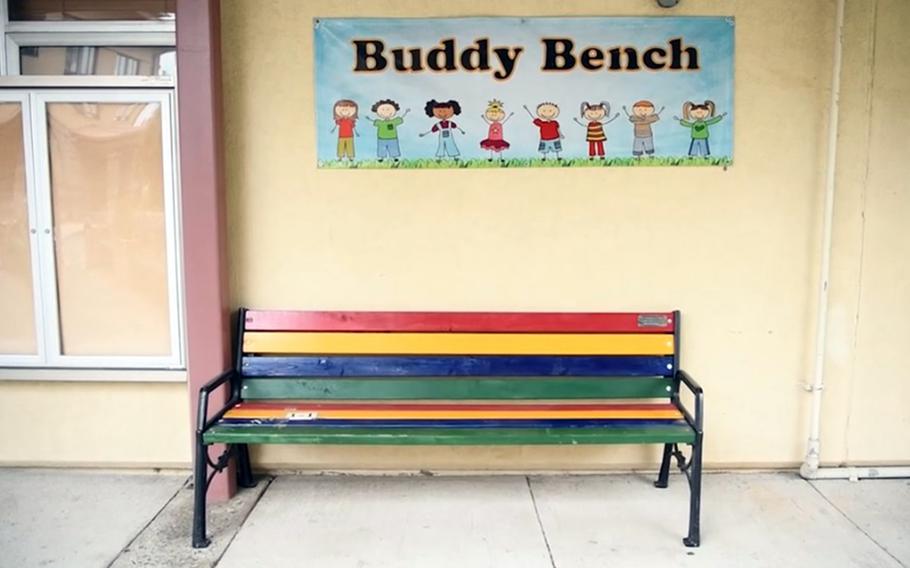
An empty buddy bench sits outside Daegu Elementary School, South Korea, in this screenshot from a video released by American Forces Network on May 28, 2020. (AFN Daegu)
Stars and Stripes is making stories on the coronavirus pandemic available free of charge. See other free reports here. Sign up for our daily coronavirus newsletter here. Please support our journalism with a subscription.
CAMP FOSTER, Okinawa — The deadline is drawing near for families in Defense Department schools to enroll their children in virtual classrooms for another school year in the coronavirus pandemic.
Students with underlying health problems or whose parents are uncomfortable sending them to brick-and-mortar classrooms have until Tuesday to enroll in online learning. School starts Aug. 24 in the Pacific and most of Europe, according to Department of Defense Education Activity school calendars.
The virtual option has been expanded to include kindergarten through 12th grade, DODEA-Pacific director Lois Rapp and other school officials said during a Facebook Live virtual town hall on Thursday. Exceptions will be made for families who arrive at their new duty stations after that date, said Terri Marshall, the DODEA-Pacific virtual school principal.
Families who choose the online option must commit to one semester with an option for the full school year, officials said.
“Because the teachers who are staffing the virtual schools are coming from our brick-and-mortar schools, it’s important for us to monitor the flow of students to make sure we have appropriate staffing” for both the virtual and traditional schools, Rapp said.
Teachers are assigned to either virtual or traditional schools based on enrollments, Marshall said. “We don’t want the enrollment to get out of hand on either side.”
Virtual options are also available for students in special education and individualized education programs, officials said.
“We do have staff in the virtual setting” for those students, said virtual school assistant principal Keri Lohmeier.
The virtual school differs from the remote learning option, used last school year after schools in South Korea closed in late February and in Japan, including Okinawa, in late March, with instruction done remotely the rest of the school year. For example, virtual-school students may receive instruction from teachers at any school in the Pacific; in remote learning, the teachers are from the students’ assigned schools.
Navigating all school aspects during the pandemic is new territory, DODEA-Pacific officials said during the town hall. “Nothing will be traditional in general,” said Jeff Arrington, the Korea district superintendent.
In-person instruction is planned at schools at bases under Health Protection Condition Bravo, which represents a moderate risk of the virus’s spread. Remote learning is planned at schools where bases are under condition Charlie, which represents a substantial risk of coronavirus transmission.
“We would move back to the brick-and-mortar schools when the health condition allows us to do so,” Rapp said.
Classroom mitigation strategies will include social distancing, wearing masks or face shields, Plexiglas dividers, frequent hand washing, hand sanitizing and disinfectant wipes, she added.
“Desks and furniture in classrooms will be social distanced to the greatest extent possible,” Rapp said. “You’ll see masks in classrooms and in hallways when students are moving; you’ll see kids in cafeterias socially distanced as much as possible.”
Procedures are in place for dealing with coronavirus cases, from identifying a student or teacher to closing and cleaning, contact tracing and reopening.
The Centers for Disease Control and Prevention “has a decision tree that we use that outlines the process for identifying a COVID-positive student and the return to school,” Rapp said, using the name of the respiratory disease caused by the coronavirus.
Football and other high-contact sports cannot take place during the fall, she said. Low-contact sports to include golf, tennis, cheerleading and cross country will be offered, with the hope that football can be moved to the spring.
ornauer.dave@stripes.com Twitter: @DaveOrnauer